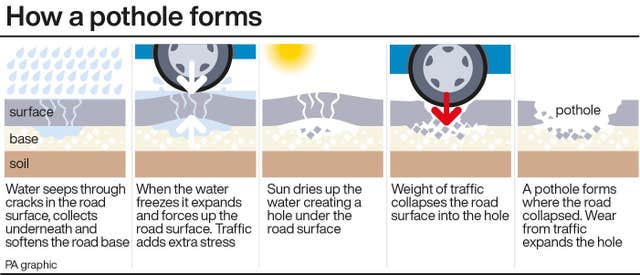The number of pothole compensation claims made to councils in Britain doubled in a year, according to new analysis.
RAC research found 20,432 claims were submitted to 18 local authorities with the largest road networks in 2023, compared with 8,327 in 2022.
Of the councils which provided data, Surrey County Council saw the biggest increase in claims, from 734 to 3,418.
The study also indicated that just 15% of claims made last year resulted in pay-outs.
The highest proportion of refusals among the local authorities included in the analysis was 98% by Gloucestershire County Council.
Payments averaged just £260 each, whereas the RAC believes a typical repair bill for pothole damage beyond a puncture is £460.
Councils refused seven out of 10 claims because they were not aware the pothole existed, which is permitted under the Highways Act 1980.
The figures, obtained in response to Freedom of Information requests, also revealed that 13 councils spent a total of more than £166,000 in legal fees to defend pothole claims.
RAC head of policy Simon Williams said: “These findings are a stark reminder that the ongoing poor condition of many of the UK’s local roads is burning holes in the budgets of both local authorities and drivers.

“While some councils appeared to prioritise paying legal fees over settling pothole claims, the cost in time and money of defending claims appears to far outweigh the expense of reimbursing drivers for the damage done to their vehicle in the first place.
“Even if a driver successfully pursued compensation, the average sum paid out of £260 is often well below the cost to fix a pothole-damaged car, for anything more serious than a punctured tyre.
“We strongly urge drivers to inform councils about any potholes they are aware of, either via the RAC’s website or using the free Stan app which collects data on the state of UK roads.
Chancellor Rachel Reeves announced in her Budget last month that the Government will aim to fund work to fix an additional one million potholes in the 2024/25 financial year by increasing local roads maintenance funding in England by £500 million to nearly £1.6 billion.
Mr Williams said: “It’s vital that this money is used by councils not to merely fill potholes, but to carry out preventative maintenance – through surface dressing roads at regular intervals to stop roads falling apart in the first place.
“Roads that are beyond reasonable repair should be resurfaced.”
Adam Hug, transport spokesman for the Local Government Association, said: “Instead of paying for costly compensation claims, councils much prefer to use their budgets to keep our roads in a good condition, in turn reducing the risk of damage to vehicles and personal injuries.
“However, this has become increasingly challenging, with an estimated and growing £16.3 billion backlog of repairs to bring all local roads across the country up to scratch.
“Each claim for compensation sent to a council is robustly judged on its own merits and in accordance to the law.
“All councils need greater, longer-term funding certainty so that they can invest in preventative treatments that help avoid more dangerous potholes developing in the first place.”
A Department for Transport spokesperson said: “For too long, this country has suffered from a pothole plague, which is why this Government is taking action by investing a further £500 million for 2025/26.
“For next year, this goes beyond our manifesto commitment to support local leaders to fix up to a million more potholes.
“We want to achieve this in the most cost-efficient way for the taxpayer by providing local authorities with multi-year funding settlements, enabling them to better maintain their roads and avoid potholes in the first place.”




Why are you making commenting on The Herald only available to subscribers?
It should have been a safe space for informed debate, somewhere for readers to discuss issues around the biggest stories of the day, but all too often the below the line comments on most websites have become bogged down by off-topic discussions and abuse.
heraldscotland.com is tackling this problem by allowing only subscribers to comment.
We are doing this to improve the experience for our loyal readers and we believe it will reduce the ability of trolls and troublemakers, who occasionally find their way onto our site, to abuse our journalists and readers. We also hope it will help the comments section fulfil its promise as a part of Scotland's conversation with itself.
We are lucky at The Herald. We are read by an informed, educated readership who can add their knowledge and insights to our stories.
That is invaluable.
We are making the subscriber-only change to support our valued readers, who tell us they don't want the site cluttered up with irrelevant comments, untruths and abuse.
In the past, the journalist’s job was to collect and distribute information to the audience. Technology means that readers can shape a discussion. We look forward to hearing from you on heraldscotland.com
Comments & Moderation
Readers’ comments: You are personally liable for the content of any comments you upload to this website, so please act responsibly. We do not pre-moderate or monitor readers’ comments appearing on our websites, but we do post-moderate in response to complaints we receive or otherwise when a potential problem comes to our attention. You can make a complaint by using the ‘report this post’ link . We may then apply our discretion under the user terms to amend or delete comments.
Post moderation is undertaken full-time 9am-6pm on weekdays, and on a part-time basis outwith those hours.
Read the rules hereLast Updated:
Report this comment Cancel